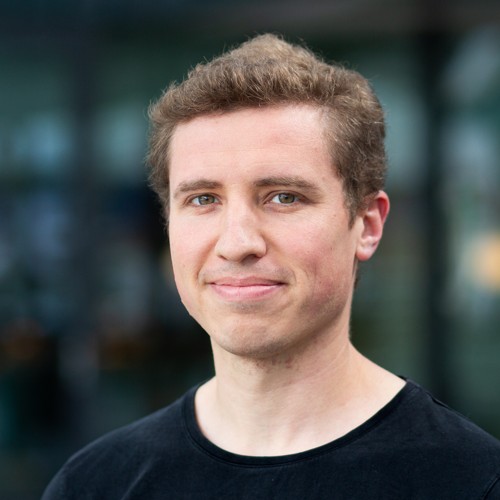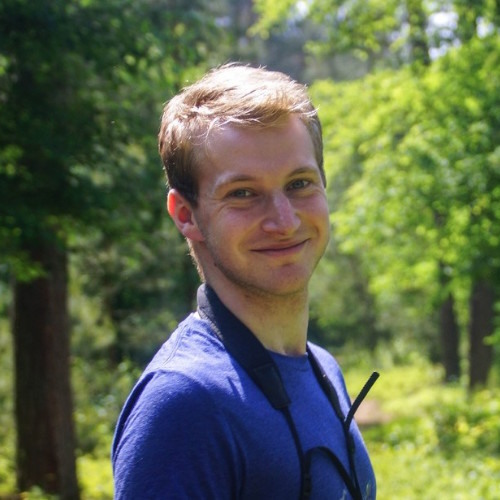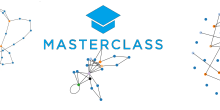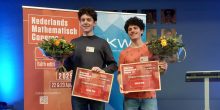In October 2025 a masterclass on networks and algorithms will be organised by the mathematics research program NETWORKS. Teachers and school students at the level of VWO 5-6 are welcome to join this two-day masterclass, no specific prior knowledge is needed, only enthousiasm about mathematics!
Following the tradition of the last six years (see here for all previous editions and all the material), also this year the NETWORKS research program (a mathematics research collaboration between the University of Amsterdam, Leiden University, the Eindhoven University of Technology, and the CWI (Centrum Wiskunde en Informatica)) will organize a two-day masterclass on the mathematics behind networks and algorithms. The masterclass will be organized in Eindhoven on the campus of the Eindhoven University of Technology.
When? Wednesday, October 22 from 10:00 to 16:00 (Lucas van Kreveld), and Friday, October 24 from 10:00 to 16:00 (Soeren Terziadis).
The program and all the relevant practical information will be provided a week before the masterclass. Important: each day of the masterclass has a different program and speaker, but it is also possible to join for one of the two days. Just indicate your preferences in the registration form at the end of this page.
Goal, speakers and topics
The two-day event is intended for secondary education students (VWO 5 or VWO 6) and teachers. The event aims to introduce secondary school students with an interest in mathematics to education at a university and to provide them with further deepening in their mathematical knowledge. The program of each day consisted of lectures, discussions, exercise sessions, simulations, and some computer programming. The speakers for NETWORKS goes to school 2024 are Lucas van Kreveld (Eindhoven University of Technology) and Soeren Terziadis (Eindhoven University of Technology). The two topics this year are Queueing Theory and Game Theory! The masterclass' content is similar to last year, but we approach the topics slightly differently. If you've followed the masterclass in 2024, we recommend you encourage younger students to join, rather than join yourself.
First, what is Game Theory?
Game theory is the study of mathematical models of strategic interactions. It has applications in many fields of social science, and is used extensively in economics, logic, systems science and computer science (taken from Wikipedia).
This field of research has grown incredibly in the last decades and has given birth to many wonderful mathematical results. Want to learn more about this modern and wonderful field within mathematics and economics? Join our masterclass! If you want to take a first proof of Game theory you can play this online game called The Evolution of Trust. Join us to learn more about the math behind it!
Soeren Terziadis: Game theory and the mathematics behind traffic congestion
Tomorrow morning, you’re preparing for a road trip to visit an old friend in another city—someone you haven’t seen in a long time. Naturally, you want to get there as quickly as possible, so you consider taking the shortest route. It seems like the most efficient option. But have you accounted for morning rush hour? What happens if everyone else has the same idea, and you end up stuck in heavy traffic?
Moreover, your trip doesn’t just affect you—it impacts every other driver on the road. But don’t feel bad—it's totally normal to be a little selfish in this situation (after all, you haven’t seen your friend in a while!). However, this raises a question: How much does “selfish” decision-making impact traffic congestion?

In this session, we’ll explore how mathematicians use Game Theory to model such strategic interactions. We will be using network flows on graphs to model traffic and the Price of Anarchy of games to quantify the impact of selfish behavior in traffic. Additionally, we’ll discuss whether central coordination or improved infrastructure can help reduce traffic congestion.
This is not only relevant for traffic on roads! What about getting to class on time? Before and after recess, hallways are always packed with pupils, each of whom needs to enter class before the bell rings, or they risk detention. Your typical (shortest) route to class may not be the fastest during peak hours. Exactly this problem was tackled by Tobias and Dylan in this article (original Dutch article here). Perhaps you will pick up where they left off after joining the masterclass?
Then there is Queueing Theory.

Determining waiting times using Queueing Theory
In general we do not like to wait. But reduction of the waiting time usually requires extra investments. To decide whether or not to invest, it is important to know the effect of the investment on the waiting time. So we need models and techniques to analyze such situations. And that is where queueing theory comes in.
Queueing problems occur often in everyday life, and it's certainly not always humans that are waiting. Think of traffic delays during rush hours, assembly lines of parts in a production factory, or bits of data being processed one at a time by a computer.
A big challenge in analyzing queues is the randomness involved. At what times do people/vehicles/parts/data arrive at the queue, and how long will they spend there? These are all random in a certain way, so queueing theory uses concepts from probability to solve its problems. Despite this challenge, we will see that in determining waiting times, we come across some elegant intuitive approaches.
Do you want to learn more about modern mathematics from young researchers themselves and to have an experience at one of the leading Dutch universities? Are you curious about how concepts you have seen at school, like functions and probabilities, are used to address modern problems? Then this masterclass is for you!
Editor's note: The Game Theory part of the masterclass was created by Artem Tsikiridis, but will be taught by Soeren.





